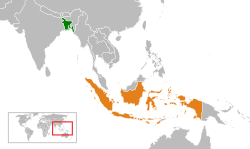Bangladesh–Indonesia relations
 From Wikipedia - Reading time: 8 min
From Wikipedia - Reading time: 8 min
 | |
Bangladesh |
Indonesia |
|---|---|
| Diplomatic mission | |
| Embassy of Bangladesh, Jakarta | Embassy of Indonesia, Dhaka |
Bangladesh and Indonesia established diplomatic relations in 1971. Indonesia is the world's largest Muslim country, whereas Bangladesh is the world's fourth largest Muslim country. They are partners in the United Nations and various multilateral organisations, particularly in international peacekeeping, the Developing 8 Countries, the Non-Aligned Movement, the World Trade Organization and the Organisation of Islamic Cooperation. Bangladesh has an embassy in Jakarta, and Indonesia has one in Dhaka. Official diplomatic relations were established in 1972 after Indonesia became one of the first Muslim countries to recognise independent Bangladesh.[1]
History
[edit]
The contacts between the Bay of Bengal region with Indonesian archipelago has commenced since centuries ago. Indonesia and Bangladesh were connected to the maritime Silk Road of the Indian Ocean trade network, where goods travels and ideas exchanged. Since the early 4th-century, Indonesia has received Hindu, and subsequently Buddhist influences from South Asia. In 9th-century the Srivijaya empire established contacts through religious and education relations with Buddhist schools, monasteries and universities in ancient India and Bangladesh, such as Nalanda and Somapura. According to I-ching (635–713 CE), a Chinese Buddhist monk who wrote his journey to Nalanda, Srivijayan royal ships had regular schedule to Bay of Bengal.[2][3] Maritime links existed between the medieval Bengal Sultanate and kingdoms in the Indonesian archipelago, particularly Sumatra which lies to the southeast of the Bay of Bengal.[4] In old Indonesian accounts, Bay of Bengal was called Teluk Benggala ("Bay of Benggala").
After the separation of Bangladesh from Pakistan, Indonesia along with other non-Arab Muslim countries such as Malaysia, Turkey and Afghanistan immediately recognised Bangladesh sovereignty in 1971. Subsequently, Bangladesh soon after its independence in 1971 established diplomatic relations with Indonesia and the Embassy started functioning from May 1972.[5]
Cooperations
[edit]Both nations welcomes initiatives in furthering the bilateral co-operation in various areas including trade and investment, agriculture, defence, education, food security, good governance, counter-terrorism, research and technology as well as disaster mitigation and management.[6] Besides bilateral co-operation, both nations exchanged their views on the two countries' co-operation in regional and global fora. As the Muslim majority countries, both nations also exchange view and voiced their concern on addressing the Rohingya Muslim refugees issue in neighbouring Myanmar.[7]
At the end of October, both Bangladesh and Indonesia saw strikes involving millions of low-wage workers demanding substantial increases in their minimum wages.[8] Semen Indonesia, the country's largest cement maker, is mulling over plans to expand its business to Bangladesh in efforts to capitalize on Bangladesh's rising consumer demand.[9] Bangladesh, Indonesia and Iran were rated as the nations most at risk from extreme weather and geophysical events according to a 2010 study. , Global risks advisory firm Maplecroft, had developed the Natural Disasters Risk Index (NDRI) to enable businesses and insurance companies to identify risks to international assets.[10]
Trade
[edit]Indonesia has recently signed a deal with a Bangladesh pharmaceutical company to export its goods to their country where Bangladesh sees another potential market for its pharmaceutical products.[11] Trade between the two countries amounted to US$1.53 billion in 2017.[12]
Diplomacy
[edit]Ambassadors of Bangladesh to Indonesia
[edit]- Khurram Khan Panni (1972-1975)[13]
- A. H. S. Ataul Karim (1976-1979)[13]
- Shamsul Islam (1979-1982)[13]
- Moinul Hossain Chowdhury (1982-1986)[13]
- Manzur Murshed (1986-1991)[13]
- A. K. M. Farooq (1991-1995)[13]
- Abdul Momen Chowdhury (1995-1996)[13]
- Zia-us-Shams Chowdhury (1997-1998)[13]
- M Afsarul Qader (1998-2002)[13]
- Nasim Ferdous (2002-2006)[13]
- Salma Khan (2006-2008)[13]
- Syed Fahim Munaim (2008)[14]
- Golam Mohammad (2010-2013)[13]
- Md. Nazmul Quaunine (2013-2016)[13]
- Azmal Kabir (2016-2020)[13]
- Air Vice Marshal Mohammad Mostafizur Rahman (2020–present)[15]
References
[edit]- ^ Ali, Syed. "Bangladesh and the OIC". The Daily Star. Archived from the original on 4 March 2016. Retrieved 6 June 2014.
- ^ "EurASEAA 14". sharpsands.com. Archived from the original on 4 March 2016. Retrieved 12 June 2013.
- ^ "Trade and Commerce". Banglapedia.
- ^ Tapan Raychaudhuri; Irfan Habib, eds. (1982). The Cambridge Economic History of India. Vol. I. Cambridge University Press. p. 130. ISBN 978-0-521-22692-9.
- ^ "Welcome Message". Bangladesh Embassy in Indonasia. Archived from the original on 28 November 2012. Retrieved 6 June 2014.
- ^ "Minister Marty Visits Bangladesh". The Consulate General of the Republic of Indonesia in Dubai, Ministry of Foreign Affairs, Republic of Indonesia. Archived from the original on 24 March 2022. Retrieved 4 June 2013.
- ^ Jafar M Sidik (2 April 2013). "Indonesia, Bangladesh discuss Rohingya issue". Antara News. Retrieved 4 June 2013.
- ^ "Indonesia, Bangladesh workers battle low wages". 10 November 2013. Retrieved 6 June 2014.
- ^ "Semen Indonesia Considers Plans for Bangladesh Expansion". Jakarta Globe. Retrieved 6 June 2014.
- ^ "Bangladesh, Indonesia and Iran top natural disaster ranking - France, Italy, USA at "high risk"". Retrieved 6 June 2014.
- ^ "Eskayef becomes first local firm to export medicine to Indonesia". The Daily Star. Archived from the original on 14 July 2014. Retrieved 6 June 2014.
- ^ "Indonesia, Bangladesh agree to boost economic ties". The Jakarta Post. 29 January 2018. Retrieved 20 April 2018.
- ^ a b c d e f g h i j k l m n "Roll of Honour". Embassy of the People's Republic of Bangladesh Jakarta. Retrieved 18 March 2013.
- ^ "Fahim Munaim made envoy to Indonesia". The Daily Star. 8 November 2008.
- ^ "Air Vice Marshal Mostafizur new Bangladesh ambassador to Indonesia". Dhaka Tribune. UNB. 11 October 2020.
 KSF
KSF